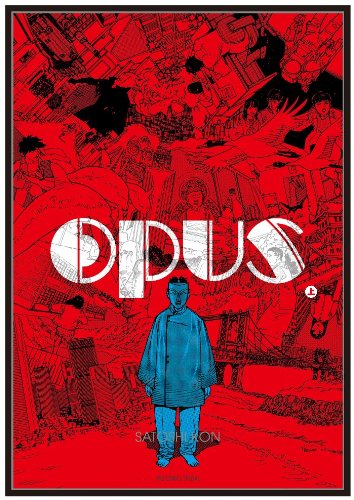
Over winter break, I started reading 『まほろ駅前の便利店』, one of the books on my Japanese reading list. It’s okay so far – lots of ただ-based puns since the main character’s surname is 多田 – and it was good motivation to discover that it’s being made into a drama series for Japanese TV. Sadly, though, the book was pushed aside by reading I had to do for school. And by manga.
Over winter break I had a thirst for comics for some reason. Not just Japanese stuff. I ordered The Walking Dead Compendium and have been working my way through that. I have the first two volumes of Neil Gaiman’s Sandman queued up as well.
I also brought back some manga from Japan. I was pleasantly surprised to find some Satoshi Kon manga that was recently released to commemorate his death late last year. In his roundup of 2010’s best manga over at Neojaponisme, Matthew Penney mentioned Seraphim, an unfinished project that Kon was working on with Mamoru Oshii (of Ghost in the Shell fame), but the other manga that was on the shelves when I was there was the two-volume, appropriately-titled Opus.

I’m through with the first volume, and I can say confidently that Kon fans should be satisfied by the content – it’s meta with equal parts action and awesome drawings. Light stuff, but lots of fun.
One linguistic thing I noticed while reading was the heavy usage of -やがる verbs. 言いやがる, 出やがる, 行きやがる, 心配させやがる, しやがる, やりやがる – it’s all over the place! I was vaguely familiar with the word from my project manager days – the pattern is used frequently in video game dialog – but I realized that I didn’t know the specific meaning and derivation, so I looked it up in the dictionary:
やがる
[助動][やがら|やがり・やがっ|やがる|やがる|やがれ|やがれ]《補助動詞「上がる」から》動詞の連用形、助動詞「れる」「られる」「せる」「させる」の連用形に付く。軽蔑や憎しみなどの気持ちを込めて、相手の動作をいう意を表す。「あいつめ、とんだうそをつきやがった」「あんなやつに負かされやがって」
As you can see, やがる is an auxiliary verb (補助動詞 – that’s a fun four-character compound to say ほじょどうし、ほじょどうし、ほじょどーし). I’ve bolded the meat of the definition: “Expresses a person’s actions with (the speaker’s) feelings of scorn/hatred included.” I added “the speaker’s” to the definition because it’s almost always spoken rather than written.
In short, it’s an auxilliary verb that means fuck. Or fucking, goddamn, damn or whatever curse word feels natural for the person and the verb that person is performing. Basically it’s a tone thing, and in English we express scorn/hatred with curse words. In Japanese, one of the ways they do it is with やがる. The content of the action being performed doesn’t differ at all from a normal 言う, 出る, 行く, する, or やる. What does differ is how the speaker feels about the action.
An example from the manga: the main character is a manga artist who gets sucked into the world of his own comic because one of the characters pops out into the real world and snatches an important page of the comic. The artist is forced to go in after him. The manga artist doesn’t just say (ページを)持って行った (He ran off with the page); he says (ページを)持って行きやがった (He fucking ran off with the page). (Aside: I feel like “He ran off with the goddamn page” is a smoother alternative, but I wanted to get “fucking” closer to the verb to match the Japanese. Any thoughts? I feel like this would be an acceptable change.)
心配させやがる and やりやがる are interesting cases. These both get used in reference to friends rather than enemies, so the former is almost like “Damn, you had us worried.” The latter I saw in a video game once as a やりやがるな! I believe it was in a shooter or in a co-op card game, and the phrase was praising the partner’s actions/play. I can’t remember how the translator handled it, but the one thing that comes to mind now is “Fuck yeah!” or “Hell yeah!” It is along the lines of “Nice work!” Most やりやがる phrases will be more similar to the example above and in reference to an unpleasant やるing.
Yahoo provides us with a nota bene after the core definition that further supports the association with fuck/some sort of casual spoken phrase. The phrase has been taken up by dudes:
◆近世以降、男性のぞんざいな調子の会話で用いられる。「…(し)ている」に「やがる」の付いた「…(し)ていやがる」は、「…(し)てやがる」となることがある。また、その前の連用形の末尾の音と融合して、「どこへ行きゃあがった」のように「…ゃあがる」となることもある。
This is another one of those phrases that are good to recognize but should never be used. I don’t trust myself to use these precisely enough to get the intended effect. Maybe a joking やりやがるな every now and then with friends I’m really close with but never in any situation even slightly more formal. It is a very useful phrase to know for game and manga translation, though, so keep your eyeballs peeled.


